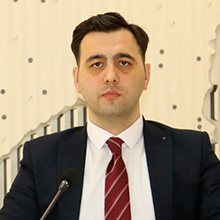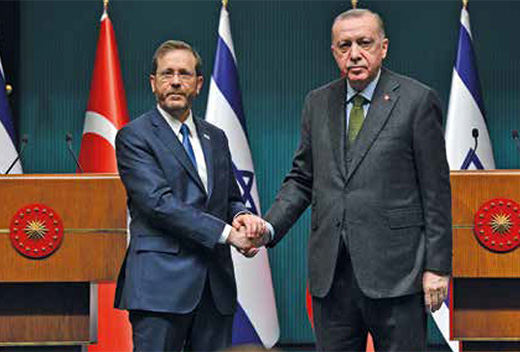
What Is Expected after the Erdogan-Putin Summit?  By Yeghia TASHJIAN, Beirut-based regional analyst and researcher, columnist, "The Armenian Weekly”
By Yeghia TASHJIAN, Beirut-based regional analyst and researcher, columnist, "The Armenian Weekly”
On August 5, Turkish President Recep Tayyip Erdoğan and Russian President Vladimir Putin had a four-hour meeting in Russia to discuss bilateral ties and regional issues. The Sochi summit comes after Ankara scored a diplomatic victory by helping broker a grain deal between Turkey, Ukraine and Russia that has eased global food crisis fears and growing concerns of possible Turkish military escalation against the Kurds in Northern Syria. What implication will the summit have on the region? READ MORE
- EGF Editor |
Published on EGF: 02.09.2022
| External Relations
-
Central Asians Are Expanding Strategic Relations with Azerbaijan  By Ayaz MUSEYIBOV, Adjunct lecturer at Azerbaijan Technical University
By Ayaz MUSEYIBOV, Adjunct lecturer at Azerbaijan Technical University
In the wake of the recent global geopolitical challenges including the war in Europe, instability in Afghanistan, and many other rapid global changes, Central Asian countries diversify and expand their economic, strategic, and political relations. As Azerbaijan is emerging as a new energy and logistic hub in Euro-Asian value chains, economic relations with Azerbaijan are crucial in regional logistics and energy spheres. Therefore, on April 20th and June 21st, 2022, Kyrgyzstan and Uzbekistan signed the declarations of strategic partnerships with Azerbaijan, respectively. Thereafter, Kazakhstan and Turkmenistan signed cooperation documents with Azerbaijan covering various directions. READ MORE
- EGF Editor |
Published on EGF: 02.09.2022
| External Relations
-
The Future of the China-US-Russia Triangle after Pelosi's visit to Taiwan  By Benyamin POGHOSYAN, PhD, Chairman, Center for Political and Economic Strategic Studies
By Benyamin POGHOSYAN, PhD, Chairman, Center for Political and Economic Strategic Studies
Since February 24, 2022, the international community's focus was concentrated entirely on the war in Ukraine and the growing Russia – West confrontation. It seemed that nothing could change the situation until the end of hostilities in Ukraine. However, on August 2 and 3, almost everyone’s attention shifted from Ukraine to Taiwan. As the Speaker of the US House of Representatives, Nancy Pelosi, stated her intention to visit Taiwan, up to half a million people were watching the trajectory of her plane on air flight tracking sites. The negative reaction of China, including the warning of President Xi during his conversation with President Biden that those who played with fire would be perished by it, created hype around this visit. READ MORE
- EGF Editor |
Published on EGF: 10.08.2022
| External Relations
-
Will Iran fight Azerbaijan if Baku seeks to invade Syunik?  By Benyamin POGHOSYAN, PhD, Chairman, Center for Political and Economic Strategic Studies
By Benyamin POGHOSYAN, PhD, Chairman, Center for Political and Economic Strategic Studies
In the last 10 days, the most discussed issue amongst Armenian media, experts and political circles was the statement of Iran’s Supreme Leader during his meetings with the Russian and Turkish presidents held in Tehran. The presidents of Russia, Iran and Turkey gathered together to discuss the future of Syria in the Astana format amidst the ongoing war in Ukraine and complete rupture of Russia-West relations. Few could imagine that the Supreme Leader would mention Armenia and, in particular, the Armenia-Iran border during the summit. However, the Iranian message was clear: Iran will not tolerate the closure of the Armenia-Iran border. READ MORE
- EGF Editor |
Published on EGF: 01.08.2022
| External Relations
-
Russia and Iran in Syria: A Competitive Partnership?  By Igor MATVEEV, PhD, Senior Research Fellow at the Institute of Oriental Studies, and RIAC expert, Moscow
By Igor MATVEEV, PhD, Senior Research Fellow at the Institute of Oriental Studies, and RIAC expert, Moscow
Yeghia TASHJIAN, Beirut-based regional analyst and researcher, columnist, "The Armenian Weekly”
Russia’s ongoing special military operation in Ukraine has sparked broad and intensive debates about future modalities of the relations between Russia and Iran in Syria. Western and Israeli analysts predict an essential growth of the political, military, and economic presence of Tehran due to Moscow’s attention switching from Syria to Ukraine. This, in turn, may shift the whole dynamics of the Russian-Iranian relations on the Syrian dossier. On the contrary, despite reports of minor pull-outs from Syria along with international media leaks about transfers of military sites to Iran and Hezbollah, Russian representatives consistently reject such forecasts, referring to a “routine rotation” but “absolutely not a withdrawal” of the Russian troops. Those speculations have intensified on the eve of the trilateral meeting of the Iranian, Russian, and Turkish leaders on Syria scheduled for July 19, 2022, in the Iranian capital. READ MORE
- EGF Editor |
Published on EGF: 21.07.2022
| External Relations
-
Realism Should Be the Basis for the Armenia-Turkey Normalisation  By Benyamin POGHOSYAN, PhD, Chairman, Center for Political and Economic Strategic Studies
By Benyamin POGHOSYAN, PhD, Chairman, Center for Political and Economic Strategic Studies
There should be realistic expectations of what can result from ongoing discussions on the normalisation of relations between Armenia and Turkey. Given the current situation in the South Caucasus, the region is far away from peace, and no one should have hopes that Armenia – Turkey normalization will solve conflicts and bring an era of peace to the region. However, in the current situation, even a contribution to regional stability is too significant an opportunity to miss.
The 2020 Karabakh war has significantly changed the geopolitics of the South Caucasus and triggered new processes. Turkey’s war involvement seemed to worsen further Armenia – Turkey relations. The Armenian government imposed a ban on imports from Turkey from January 2021 due to Turkey's open and evident promotion and support for the Azerbaijani war effort. However, after the early parliamentary elections in Armenia held in June 2021, Armenian officials started to speak about the necessity to normalize relations with Turkey. These discussions ended with the assignment of a special representatives to start negotiations, and the first meeting took place on January 14, 2022. READ MORE
- EGF Editor |
Published on EGF: 21.07.2022
| External Relations
-
Russia’s Need to Circumvent Sanctions Gives New Life to North-South Project
 By Fuad SHAHBAZOV, Baku-based independent regional security and defence analyst
By Fuad SHAHBAZOV, Baku-based independent regional security and defence analyst
With the unprovoked military intervention in Ukraine, Russia has been isolated economically and politically due to the Western-imposed sanctions. But while the sanctions banned Russia from trading with the Western states, particularly in the energy field, some nations still prefer to maintain trade relations with Moscow. Countries like Iran, China and India are seeking to strengthen trade turnover by pushing the International North-South Transport Corridor (INSTC) project for a better connection via a multimodal transport network that spans rail, road, and sea. READ MORE
- EGF Editor |
Published on EGF: 14.07.2022
| External Relations
-
Agreement on Nuclear Deal Increasingly Unlikely  By Benyamin POGHOSYAN, PhD, Chairman, Center for Political and Economic Strategic Studies
By Benyamin POGHOSYAN, PhD, Chairman, Center for Political and Economic Strategic Studies
The election of Joe Biden as president in November 2020 raised hopes among the international community that the United States will restore the nuclear deal signed in 2015. Many architects of the deal returned to positions in the White House and State Department. The other signatories of the deal, including the three EU states, China and Russia, were ready to contribute to the restoration of the deal. Conventional wisdom said that Iran should be interested in restoring the deal, too. The economic downturn triggered by the re-imposition of the US sanctions created significant challenges for the Iranian government. READ MORE
- EGF Editor |
Published on EGF: 06.07.2022
| External Relations
-
The War in Ukraine and the Future of the World Order  By Benyamin POGHOSYAN, PhD, Chairman, Center for Political and Economic Strategic Studies
By Benyamin POGHOSYAN, PhD, Chairman, Center for Political and Economic Strategic Studies
Since the start of the Ukraine war in February 2022, discussions have been underway about the impact of the war on the evolving global order. The transformation of the world order is a very complicated and multi-layered process, and history tells us that it takes decades and is often accompanied by bloody conflicts between great powers. In the last decade, there were several prevailing predictions of the world order – a new bipolar world dominated by the US and China, a multipolar world with several equal players such as the US, China, Russia, India and the EU, and a nonpolar world characterized by constant conflicts and instability. READ MORE
- EGF Editor |
Published on EGF: 01.07.2022
| External Relations
-
Israeli-Turkish Relations: Challenges and Opportunities  By Eugene KOGAN, Tbilisi-based defence and security expert
By Eugene KOGAN, Tbilisi-based defence and security expert
Even though Israel and Turkey normalised relations in June 2016 following the May 2010 Mavi Marmara Flotilla incident when Israeli soldiers killed ten people on board a Turkish vessel and the subsequent diplomatic rupture, Ankara’s support of the Hamas movement situated in the Gaza Strip continues to undermine bilateral relations.
The establishment of an official office in Istanbul in 2012 and its members are perceived as a thorn in the eye by the Israeli Government. Tel Aviv would like Erdoğan to close the Hamas office and expel its members from Turkey; however, this Israeli wish is not going to be granted any time soon since Erdoğan’s words do not translate into deeds. The signature of the Abraham Accords highlighted two divergent trends in the region: Turkey’s continued isolation and Israel’s strengthened position. This resulted in Erdoğan’s intention to improve relations with Israel. READ MORE.
- EGF Editor |
Published on EGF: 23.06.2022
| External Relations
-
